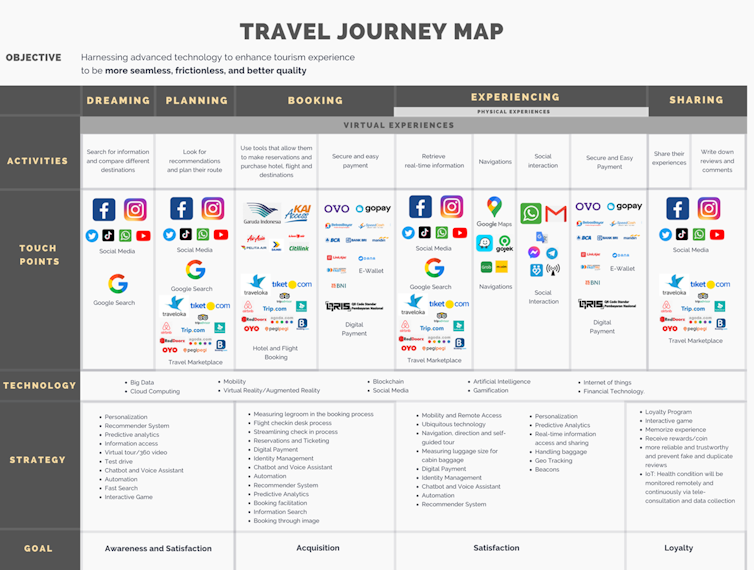
In 2020, the COVID-19 pandemic hit the world and has been devastating for human life. Global tourism collapsed as tourist arrivals decreased by 71% in 2021.
That has had a significant impact in countries like Indonesia, where tourism was booming pre-pandemic: tourism generated Rp536.8 trillion in 2017, or 4.1% of Indonesia’s total gross domestic product, with 12.7 million jobs in the industry.
However, digital technology adoption has been an unexpected silver lining of the pandemic, emerging as a tool that can help accelerate tourism recovery worldwide. It shifts tourist preferences and priorities towards digital travel. It also presents new business opportunities in offering more relevant online experiences.
More tourism activities now offer hybrid events, particularly for music festivals, concerts and business meetings. Virtual reality and augmented reality (VR/AR) provide a new travel experience, and have been adopted by hotels, destinations and online travel marketplaces all over the globe.
There is, however, a challenge in technology adoption to support tourism in Indonesia: its comparatively low information and communication technology (ICT) readiness.
According to a May 2022 World Economic Forum report, Indonesia was ranked 68th in 2020 in its ICT readiness. This ranking was based on the expansion of individual internet usage and 3G mobile broadband network coverage in each country.
While Indonesia’s ranking had slightly increased from 70th in 2019, it was behind Singapore, Malaysia, Thailand, and Vietnam.
The use of digital platforms for financial services, transportation and shipping and leisure activities in Indonesia are slow, and should be a subject for improvement.
From dreaming to sharing, tech can help tourists
One study emphasises how technology needs to be a catalyst to create meaningful tourism experiences.
The tourist experience is the backbone of business success, as it drives people to make travel decisions.
The key to enhancing this experience is understanding how tourists make travel decisions through different travel stages: from dreaming, planning, booking, and experiencing, to sharing.
Using technology to improve the tourism experience throughout all travel stages is critical. Technology helps connect tourism supply and demand, creating physical and virtual experiences. It enables tourism providers to maintain competitiveness in the market. Tourists also use technology to plan their trips, experience destinations and reflect on their travels to obtain satisfaction.
Several technologies that shape the tourism experience include Big Data, cloud computing, VR/AR, blockchain, artificial intelligence, social media, gamification and the internet of things.
For example, the Skyscanner chatbot on Facebook or Whatsapp assists with travelling needs, from digging out information to offering fast responses during the booking process. In another example, Iceland has upgraded Keflavik Airport’s automated baggage tracking system to alert travellers when their baggage is nearby.
Advanced technology creates value throughout tourism experiences by providing choices and convenience, flexibility, safety, fun and enjoyment, and real-time, reliable information. As a result, tourists have more options and flexibility in every stage of their travel journey: from acquiring information, planning an e-itinerary, booking and purchasing flights or hotels online, to sharing their experiences.
Opportunities and challenges for Indonesia
Indonesia has a large population, growing mobile internet penetration and a vibrant start-up ecosystem, with the most growth recorded in e-commerce and online transportation. All of those factors demonstrate Indonesia’s potential for adopting advanced technology.
But Indonesia must also catch up to other countries in capturing its digital potential. The inequality of ICT infrastructure between regions and income classes has become the main barrier to the accessibility of good quality internet.
Moreover, digital literacy – especially on safety – is low and needs improvement.
A World Bank report shows digital payment adoption is relatively low, with 50% of Indonesian online buyers preferring to pay cash on delivery.
The lack of awareness, knowledge and trust, regulation and appropriate infrastructure curb e-commerce growth in Indonesia.
Such conditions could hinder the success of the Indonesian tourism industry, as it needs to maintain competitiveness amid growing digital demands. Without advanced technology, the tourism industry will not thrive in the ever-changing global market.
A map for the future
The Indonesian government needs a map to design digital strategies that match with tourists’ expectations and needs. The map would present tourists’ experiences, including their interactions with the most relevant digital touchpoint in every travel stage (from dreaming to sharing).
Such a map could address digital tourism challenges, and help the tourism industry offer a frictionless, seamless, and better-quality tourism experience.

The map could also raise awareness among tourism stakeholders about the current digital technology in Indonesia and tourism in particular.
Areas that the Indonesian government could focus on to provide the best digital services include:
- improving digital government services in the tourism sector
- utilising digital strategies for promoting tourism
- adopting data integration and interoperability in the tourism sector
- investing in digital literacy for tourism industry workers
- more research and development for technology adoption in the tourism sector
- enhancing digital services for businesses, and
- simplifying, updating and revising policies and regulations related to digitalisation in the tourism sector.
Implementing the action plans above could accelerate digital transformation in Indonesia’s tourism industry. In doing so, it would increase the quality of tourism services on offer for people interested in visiting Indonesia.
Ainnoun Kornita terafiliasi dengan Kementerian Pariwisata dan Ekonomi Kreatif. Saya bekerja di organisasi tersebut.
This article was originally published on The Conversation. Read the original article.







